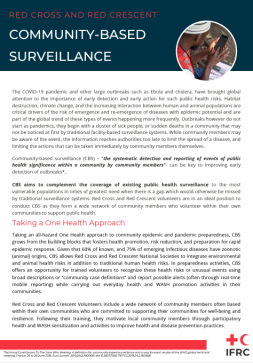The COVID-19 pandemic and other large outbreaks such as Ebola and cholera, have brought global attention to the importance of early detection and early action for such public health risks. Habitat destruction, climate change, and the increasing interaction between human and animal populations are critical drivers of the risk of emergence and re-emergence of diseases with epidemic potential and are part of the global trend of these types of events happening more frequently. Outbreaks however do not start as pandemics, they begin with a cluster of sick people, or sudden deaths in a community that may not be noticed at first by traditional facility-based surveillance systems. While community members may be aware of the event, the information reaches authorities too late to limit the spread of a disease, and limiting the actions that can be taken immediately by community members themselves.
Community-based surveillance (CBS) – "the systematic detection and reporting of events of public health significance within a community by community members"- can be key to improving early detection of outbreaks (Euro Surveill. 2019).
CBS aims to complement the coverage of existing public health surveillance to the most vulnerable populations in times of greatest need when there is a gap which would otherwise be missed by traditional surveillance systems. Red Cross and Red Crescent volunteers are in an ideal position to conduct CBS as they form a wide network of community members who volunteer within their own communities to support public health.




